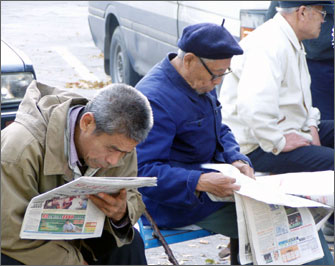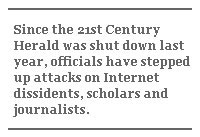‘Bad Press’ Causing Headaches for Beijing
'Bad Press' Causing Headaches for Beijing

BEIJING: When Hu Jintao and Wen Jiabao began to take over the reins of the Chinese Communist Party and China's government in November 2002, liberal intellectuals expressed modest hopes that the new leadership would loosen the tight gag on freedom of expression. Against the backdrop of China’s increasingly closer integration with the world, the government did indeed relax some controls in the first few months, but it has since become clear that the Communist Party is not about to open the door to its own demise. Still, with critics increasingly bolder and more determined, there can be no return to the past.
In early 2003, Hu rapped state television network on the knuckles for pandering to government officials, Politburo propaganda czar Li Changchun called for more hard-hitting reporting and officials were told to be more responsive to the needs of the media. Journalists took up their offer to be more open in their reporting, even though it meant nudging the invisible line that every journalist knows is not to be crossed.
But the promise of a Beijing spring was quickly dashed in March 2003 when the outspoken daily paper 21st Century Herald published a letter by Li Rui, former secretary to Mao Zedong, harshly criticizing past and present Party leaders – specifically Chairman Mao, Deng Xiaoping and Jiang Zemin – for being autocratic. The newspaper was soon shut down, and more than a year later remains closed.

Since then, officials have stepped up attacks on Internet dissidents, scholars and journalists, leading some observers to say the freedom of speech today is more threatened than in the grim days shortly after the 1989 Tiananmen democracy crackdown. While there has been a major relaxation of media taboos—from reporting on disasters to corruption and social issues—the unwritten rule remains that any news that potentially threatens the Party’s authority is strictly off-limits.
Earlier this year, two former editors and the former general manager at the hard-hitting Southern Metropolis Daily in Guangdong were arrested on charges of embezzlement and bribery. Chinese sources believe the real reason for their arrest was the newspaper’s active coverage of SARS and its reporting of the case of Sun Zhigang, a graphic designer who was beaten to death while in police custody in Guangzhou last year.
The most telling example of the clampdown concerns a best-selling book published earlier this year titled “An Investigation of the Chinese Peasantry." The title is eerily similar to Mao’s seminal work, "The Report on the Investigation of the Peasant Movement of Hunan", which set the stage for the Party-led revolution. This shocking look at the plight of farmers was an instant hit, and the husband-wife authors were soon turning up on TV shows and in the pages of newspapers and magazines around the country.

But despite the new leadership’s stated concern for the rights of farmers, the book’s assertion that things are not so good down on the farm was too much for the Party to accept. The Propaganda Department banned the book a few months ago, and co-authors Chen Guidi and Wu Chuntao now face a lawsuit by a local official whose son is a judge in the local court. Attempts to move the hearing to a neutral court have failed, and the farmers quoted in the book are too afraid to testify in court, leaving the authors despondent.
Despite being banned, the book has gone on to sell millions of pirated copies on the streets. Nonetheless, the case is a sad reminder of the consequences of expressing one’s opinions.
In February, Jiang Yanyong, the 72-year-old retired Army surgeon who a year earlier had gone to the foreign media with proof of SARS, was back in the spotlight. Bolstered by his SARS fame, Jiang wrote an open letter to the leadership in which he called on the government to admit responsibility for the 1989 crackdown during the Tiananmen protests that left hundreds, and possibly more than 1,000, dead. In his letter, the retired surgeon recalled treating wounded and dying people in his hospital on the morning of June 4. Since releasing his letter, however, Jiang's fame has not been enough to protect him. He and his wife were both detained on June 1 on their way to the U.S. Consulate to apply for a visa to visit their daughter in the U.S. His wife was released two weeks later, but Jiang was held for 49 days while undergoing what the Washington Post reported were “brain-washing sessions.” Whether Jiang recanted under pressure is still unclear, but the government has said that his case is still not closed.

The Party is clearly facing a dilemma. If Jiang had not been dealt with, say intellectuals, it would have sent a signal that people can speak up. At the same time, if 49 days in jail wasn’t enough to break the elderly doctor’s will and he continues to publicly criticize the government,, the Party will face a very embarrassing situation. Although Jiang’s detention and release has not been reported anywhere in the Chinese media, more and more Chinese are learning the news every day, and respect for him is growing.
Nor is Jiang an isolated case.
In May, Bao Tong, a prominent liberal and former high-ranking official, lashed out at the Party in the run-up to the June 4 anniversary this year. In his statement, Bao took the Party to task for failing to advance reforms since 1989. “On the contrary, some things have even gone backwards,” he wrote. He particularly cited Party interference in the media and publishing sectors. Bao, long a thorn in the government’s side, spent seven years in prison for opposing the 1989 crackdown, and is under round-the-clock surveillance. Foreign journalists who try to telephone him say the calls are repeatedly disconnected.
Earlier this year, Jiao Guobiao, a professor at the prestigious Beijing University, and a former journalist, wrote a scathing attack on the Propaganda Department, which oversees the media, saying the Party organ uses Nazi tactics and is the “stumbling block” in the development of Chinese society.
“Today, you can’t mention ‘Jiang Yanyong,’ tomorrow you can’t reflect on SARS, the day after tomorrow there will be some new taboo…,” he wrote. While Jiao’s article will obviously never appear in the media, it has circulated widely on the Internet to the delight of many Chinese.

Government measures to silence its critics don’t appear to be having the intended effect, as journalists and scholars continue to speak out and the government finds it increasingly difficult to be the sole guardian of the truth. Aggressive young journalists continue to dig into a growing array of sensitive news, from the recent fake baby milk powder scandal that left dozens of babies dead around the country to the growing army of petitioners who arrive each day in the capital to air their grievances at central government officials over runaway local corruption.
While Chinese intellectuals and journalists acknowledge that they are able to speak out about an increasing number of topics, they warn that this should not be mistaken as a move toward true freedom of expression. Sensitive political issues will continue to remain off-limits for the foreseeable future, they say. Neither Hu Jintao nor Wen Jiabao will sanction any reform that will undermine the Party’s—and their own--authority. As one Western diplomat says, “The Party is not in the business of putting itself out of business.”
Paul Mooney, a freelance journalist, has been reporting on China for 15 years.